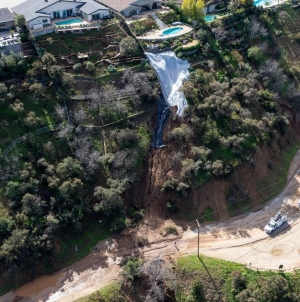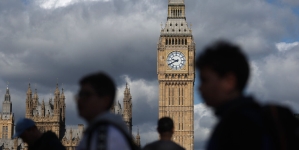-
Trump Eligibility Ruling Elicits Mixed Reactions Ahead of Super Tuesday - March 5, 2024
-
A portion of Mulholland Drive, damaged by mudslides in winter storms, reopens - May 26, 2024
-
‘Maybe You Don’t Want to Win’ - May 26, 2024
-
Donald Trump Putting Law Enforcement in Danger: Attorney - May 26, 2024
-
Avoid the waters of these 5 L.A. County beaches this holiday weekend, public health officials say - May 26, 2024
-
Bawdy Comedy ‘Anora’ Wins Palme d’Or at Cannes Film Festival - May 26, 2024
-
Map Shows Heat Wave Zone Spread Into Five New States - May 26, 2024
-
Azusa police arrest suspected slingshot-wielding vandal - May 25, 2024
-
Donald Trump Hammers Judge Ahead of Jury Instructions - May 25, 2024
-
Sometimes U.S. and U.K. Politics Seem in Lock Step. Not This Year. - May 25, 2024
Trump Eligibility Ruling Elicits Mixed Reactions Ahead of Super Tuesday
The U.S. Supreme Court brought certainty on Monday to a primary season muddled by confusing and divergent state-level rulings by deciding unanimously that the 14th Amendment did not allow states to disqualify former President Donald J. Trump.
But reaction to the ruling showed that the challenges to Mr. Trump’s candidacy had hardened political dividing lines and angered Republicans who saw the lawsuits as an antidemocratic attempt to meddle in the election. And the ruling was handed down as voters in more than a dozen states prepared for Super Tuesday primaries.
“It motivated people to get involved,” said Brad Wann, a Republican Party caucus coordinator in Colorado, the first of three states to disqualify Mr. Trump, and the state at the center of the Supreme Court case. “They feel like the Democrats in this state are trying to take basic rights away. People are talking at coffee shops, at churches, saying we cannot let this happen.”
The ballot challenges, which were filed in more than 30 states, focused on whether Mr. Trump’s efforts to overturn his 2020 election defeat disqualified him from holding the presidency again. The cases were based on a clause of the 14th Amendment, enacted after the Civil War, that prohibits government officials who “engaged in insurrection or rebellion” from holding office.
On Monday, all nine Supreme Court justices agreed that individual states could not bar candidates for the presidency under the insurrection provision. Four justices would have left it at that. A five-justice majority, in an unsigned opinion, went on to say that Congress must act to give that section force.
In Illinois, where the Supreme Court’s decision overtook a finding by a state judge last week that Mr. Trump was ineligible, many voters said Mr. Trump belonged on the ballot.
The former president had remained on the ballot in the three states to disqualify him — Colorado, Illinois and Maine — while he appealed those rulings. The Supreme Court’s opinion provided a final resolution.
“People are trumping up everything they can on him,” said Herbert Polchow, 67, a Republican retiree in Rankin, Ill., who said the ballot challenges were just a way for Democrats to keep Mr. Trump from becoming president again.
Zachary Spence, 42, of Danville, Ill., said the Supreme Court’s decision was a victory for voters.
“You can’t take away people’s choice,” said Mr. Spence, a supporter of the former president.
In Colorado, Patrick Anderson said he had voted for Mr. Trump twice but would not do so a third time because of Mr. Trump’s denial of the 2020 election results. He said he agreed with the Supreme Court, to a point.
“I think presumption should be to let the voter have their say,” Mr. Anderson, 77, said. “But I don’t think there should be a popularity contest if there is a crime involved.”
While Republican officials had been united in opposition to the ballot challenges, the question had divided Democrats, some of whom doubted the political and legal merits of challenging Mr. Trump.
Even for those who supported the ballot challenges, the ruling on Monday brought clarity after weeks of uncertainty.
“I believe Colorado should be able to bar oath-breaking insurrectionists from our presidential ballot, but the U.S. Supreme Court disagrees,” said Jena Griswold, the Colorado secretary of state and a Democrat. “So in accordance with that, Donald Trump is an eligible candidate and votes for him will be counted in the state of Colorado.”
Shenna Bellows, Maine’s Democratic secretary of state who ruled in December that Mr. Trump was not eligible to appear on the state’s primary ballot, issued an updated ruling on Monday reflecting the Supreme Court decision. “Consistent with my oath and obligation to follow the law and the Constitution,” she wrote, “I hereby withdraw my determination that Mr. Trump’s primary petition is invalid.”
The new certainty, officials on both sides of the issue agreed, was important. Colorado and Maine’s primaries are on Tuesday, and the Illinois primary is on March 19.
“Now that this decision has been made, voters in Super Tuesday states can hold their elections without any additional distraction regarding this matter,” said Secretary of State Wes Allen of Alabama, a Republican.
Those who led the attempts to have Mr. Trump taken off the ballot expressed disappointment and stood by their decision to bring the challenges.
Ben Clements, the chairman of Free Speech for People, a group that filed several state-level challenges, called the Supreme Court’s ruling “a great disservice to the country and to our constitutional democracy.” He said in an interview that the attempt to disqualify Mr. Trump “was absolutely a fight worth fighting.”
Some voters agreed. Richard Utman, 69, a political independent from Palermo, Maine, said that he was disappointed in the court’s decision, and that “the ruling shows the Constitution is broken.”
“He’s a criminal,” Mr. Utman said. “He has no business holding office. He has no business being president.”
John Anthony Castro, a long shot Republican presidential candidate who has filed federal lawsuits challenging Mr. Trump’s eligibility in more than 20 states, said he did not believe the Supreme Court opinion prevented him from pressing on with his court cases. None of Mr. Castro’s lawsuits have been successful, and many have been dismissed or withdrawn.
Many Republicans used dire language to describe the challenges to Mr. Trump, and some spoke ominously about what might have happened if the Supreme Court had reached the opposite decision.
Jay Ashcroft, Missouri’s secretary of state, had previously said that conservative states could try to disqualify President Biden if the Supreme Court had allowed for Mr. Trump to be removed from the ballot.
“I’m grateful the Supreme Court put a stop to this idiotic attempt to subvert our election process,” said Mr. Ashcroft, a Republican.
Senator Deb Fischer, Republican of Nebraska, said that “Americans can celebrate that the Supreme Court has rejected this authoritarian effort that would interfere in our elections and block Donald Trump from even standing for office.”
Gov. Kim Reynolds of Iowa, a Republican, praised the ruling and accused Colorado of a “blatant attempt to subvert the will of the American people in the upcoming presidential election.”
Some voters who did not like Mr. Trump said they, too, agreed with the Supreme Court.
At an early voting site in Wheaton, Ill., a suburb of Chicago, Laura Edwards said she worried that the legal fight over Mr. Trump’s appearance on ballots might have given him a political boost.
“It gives him more attention and he’ll use this as a victory,” said Ms. Edwards, 42, who voted in the Democratic primary. “They should have left him on the ballot and left us to hope that logical people will not vote for him.”
Karl Klockars, 78, a lawyer from Wheaton who voted early for a candidate other than Mr. Trump in the Republican primary, said that the Supreme Court “did the right thing, and it’s evident by the fact that there were no dissenters.”
And Gregory Hinote, 64, a retiree from Danville, said he did not usually vote in the primaries, but did this time because he believed voting was the best way to keep Mr. Trump from becoming president again.
“Voting is the way,” said Mr. Hinote, who selected a Democratic primary ballot. “I think we should vote and vote him out. That’s the way to do it — not ban state by state.”
Robert Chiarito reported from Wheaton, Ill., Farrah Anderson from Danville, Ill., Dave Philipps from Colorado Springs and Mitch Smith from Chicago. Reporting was contributed by Maggie Astor, Murray Carpenter, Adam Liptak and Jenna Russell.































